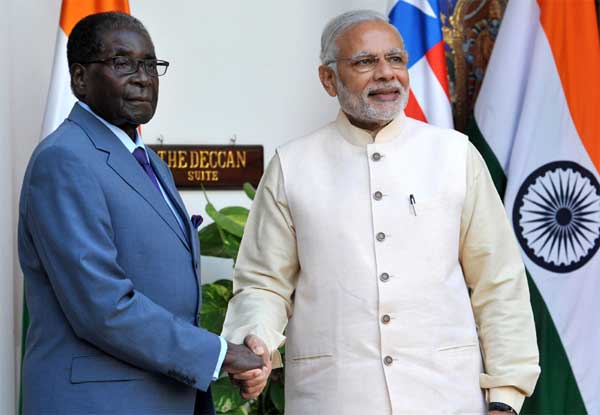On Thursday, Zimbabwe President Robert Mugabe (left) and Indian Prime Minister Narendra Modi (pictured) criticized the UN Security Council for Africa’s and India’s exclusion, after Mugabe struggled to clear a step at the India-Africa Forum Summit in New Delhi, India.
RELATED: THE UNITED NATIONS TREAT AFRICAN NATIONS LIKE SECOND CLASS CITIZENS
The UN Security Council’s members include China, Russia, the United Kingdom, the United States, and France.
Writing about the significance of this council, Face2Face Africa Contributor Erharuyi Idemudia wrote in “The United Nations Treat African Nations Like Second Class Citizens“:
The Security Council is a critical and central organ of the U.N. It is mandated with unequalled powers to maintain international peace and security. Outlined in the U.N. Charter, the Security Council’s powers, which are executed through resolutions, include establishment of peacekeeping operations, establishment of international sanctions, and the authorization of military actions.
Since its founding in 1946, the Security Council has consisted of five permanent members who hold sole authority to veto substantive resolutions put before the Security Council for deliberation. These five permanent members include four nations that are considered the victorious powers of World War II: The Republic of China (replaced by “The People’s Republic of China”), The Union of Soviet Socialist Republics (succeeded by “Russia”), the United Kingdom, the United States of America, and one nation liberated from Nazi Germany during World War II: France.
The veto power exercised by the aforementioned five permanent members finds its importance in Article 27 of the U.N. Charter. Under Article 27, a resolution on substantive matters is adopted if nine or more of the 15 Security Council members vote in its favor and if the resolution is not vetoed by any of the five permanent members.
In essence, through the last 60 years, together these five permanent members have maintained authority over major decisions affecting and controlling the economic, political, military, and social direction of the world. Consequently, due to the fact that Africa is not a permanent member of the Security Council and does not have veto power, the continent has been left without a decisive voice in the direction of the world.
During the India-Africa Summit, Mugabe criticized the UN Security Council for being “defective” and said, “We are saying that we demand equality…. We are saying, let’s amend the charter of the UN.”
While Modi spoke to the timeliness of the UN Security Council issue, “The world is undergoing political, economic, technological and security transition on a scale and speed rarely seen in recent history.
“Yet our global institutions reflect the circumstances of the century that we left behind, not the one we are in today…unless they adjust to the changing world, they risk becoming irrelevant.”
And while both leaders indeed addressed a key injustice, the “issue” that seems to be on most minds is the fact that the 91-year-old Mugabe struggled to clear a step just before shaking Modi’s hand.
In fact, Elias Mambo of news site Zimbabwe Independent wrote of the “incident“:
Government officials and aides close to Mugabe say they have closely observed in recent years that the president has been fast deteriorating in terms of physical stature, mental alertness and health.
Mugabe, who will be turning 92 in the next four months, is widely seen as no longer fit to govern with close government officials and aides saying old age and health problems are taking a heavy toll on him.
However, yesterday Mugabe stumbled backwards before he took to the stage until Modi and aides helped him to move forward. After his speech, Modi again helped Mugabe to get off the podium.
With hope, the more pressing UN Security Council issue will prevail.










